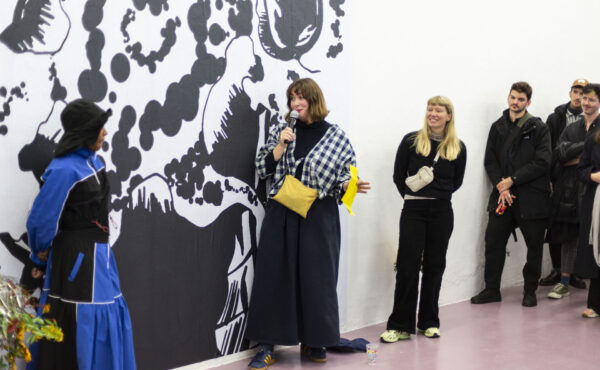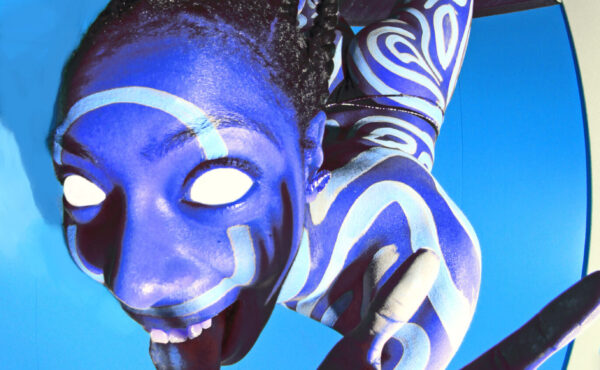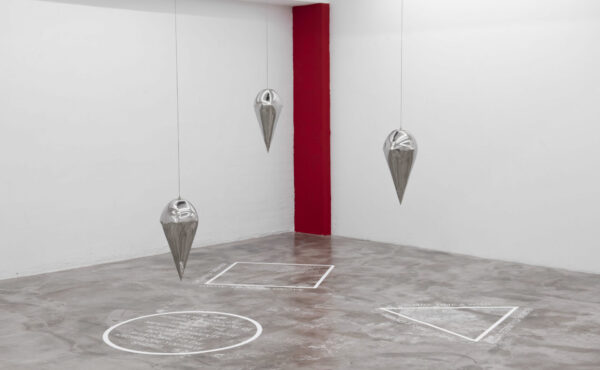
Elia Nurvista, Sucker Zucker, 2016. Part of groupexhibition At the Table at Garage Rotterdam. Photo: Aad Hoogendoorn
Excessive devouring, banana passports and hunger strikes: discussing ‘At the Table’ at Garage Rotterdam
Consisting of both an exhibition and several public dinners, the groupshow At the Table at Garage Rotterdam sees food as the perfect medium to discuss major issues in contemporary society.
In the centre of At The Table, a group exhibition on food at Garage Rotterdam, stands the enormous modular Dining Table by Rikkert Paauw. The rest of the exhibition takes place in proximity to the table.

Diana Al-Halabi, Chewing with Political Teeth, 2022. Part of groupexhibition At the Table at Garage Rotterdam. Photo: Aad Hoogendoorn
There is an artist who shares the history of the sugar plantations and slavery (Sucker Zucker by Elia Nurvista). There is an artist who researched into political prisoners’ hunger strikes (Chewing with Political Teeth by Diana Al-Halabi). There is a video installation with visceral images of excessive devouring and indulgence to the sound of an erotic voice (Gradual Unease by Hala Tawil), that is in conversation with a video installation across the room showing grotesque sweets in the fridge. Featuring a selection of rough clay and smooth porcelain bread loaf sculptures, the work refers to bakeries that differ in their social status (The Bare Necessities by Bruno Baietto).
Tiiu Meiner: ‘The reason we chose food was because we saw how powerful this medium is for discussing many different contemporary issues’

Hala Tawil, Gradual Unease, 2018. Part of groupexhibition At the Table at Garage Rotterdam. Photo: Aad Hoogendoorn

Then, right next to the bread loaves is another video installation of a banana with a stamped passport and a video depicting the journey from its Ecuadorian origins to its end in Iceland, making criticism about both about the food industry and nation state borders (Banana Passport by Johanna Seelemann & Björn Steinar Blumenstein).
These topics are broad and varied, each with an extensive research carried out by the artists behind them. Putting such variety in one space is an enormous task, as it requires a delicate curation. Tiiu Meiner, who curated the exhibition together with Rawad Baaklini, explains: ‘The reason we chose food is because we saw how powerful this medium is for discussing many different contemporary issues. It’s very relatable as well; allowing us to really talk about these themes.’
The power of food as an artistic medium is something that is worth exploring, they find. A book by Annemarie Mol, called Eating in Theory, inspired the exhibition. The book features a chapter in which Mol responds to a journal geographer John Wylie kept while hiking through the landscapes of Brittany. While Wylie writes about the landscapes in great detail, he only briefly mentions that he stopped somewhere to have lunch. The author picks up on this fact. She emphasises that, while neglected, this food was a necessary factor for Wylie. It was this ‘buckwheat pancake with goat cheese and honey’ that allowed him to continue with his journey, converting ‘energy to walking’. Food and food culture are often overlooked. Annemarie Mol brings them to the forefront in the chapter of her book, much like Rawad Baaklini and Tiiu Meiner bring them to the forefront in this gallery space.

Johanna Seelemann & Björn Steinar Blumenstein, Banana Passport, 2016. Photo: Aad Hoogendoorn
Their vision is exactly that of having an exhibition that evokes a feeling of having a dinner at the table, including the problematic family members, including the overburden of the host (usually a mother figure), including the messiness, including the difficult topics, and including the incohesive manner of conversations around the table. Here, the exhibition space is seen as an opportunity for discussion of food-related topics that are heavy and complex. As Baaklini points out, the banana work is an example: ‘We consume bananas all the time, but hardly ever talk about the story behind them. This exhibition very much serves as an opportunity to start talking about it.’
Baaklini: ‘We consume bananas all the time, but hardly ever talk about the story behind them’
Talking about food and food culture is also central to the dinners that are organised as part of the exhibition. I visited one that was titled Speaking of Land and Seasons and was organized by artist collective Seasonal Neighbours. They shared their research and fieldwork as pickers in Belgium and the Netherlands, talking about aspects of seasonality and labour, as well as cohabitation and land. Seasonal Neighbours’ research is rooted in looking at seasonal workers that come to harvest produce. The work that is crucial to all of our livelihood but remains largely invisible. It became apparent during the Covid-19 lockdowns when seasonal workers were unable to move across borders, leaving the farmers struggling to find labour. This prompted the collective to form and to learn more about the lives, conditions, and social aspects of farms.
As they spoke of their experiences of working, living and visiting farms, the audience enjoyed the food and the objects and memorabilia that the members of the collective laid out onto the tables. The format of the evening allowed for a level of informality where anyone felt comfortable to ask questions. Each of the members of the collective took their own approach to talk about the subjects of their research, from readings of diary accounts, to poetry, to impromptu storytelling.

Dinner organized by Seasonal Neighbours. Photo: Vlada Predelina
Opening conversations and demystifying the processes that are in place around the topic of food in an arts space may seem odd at first, but it is in fact the perfect environment to do so. It does not take long for the mind to connect to the still life painting in the likes of Still Life with Fruit (1605) by Caravaggio or Quinces, Lemons, Pears, and Grapes (1807) by van Gogh. The connection between art and food has been intrinsic for centuries, making it the exactly right environment to discuss, share research, and learn the history, story or hard truth that each ingredient or fruit that we consume holds.
At the Table runs until the 9th of July 2023, at Garage Rotterdam
Final public dinner Natafelen: Palestinian dinner by Amanny Ahmad, 7 Jul 2023, 6 p.m
Vlada Predelina
is an artist researching the role of tacit knowledge systems of women as a sustaining force in relation to land and colonial expansion through gatherings around a particular medium as a focus to bring out intimate discussions and situated histories


